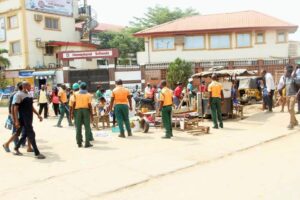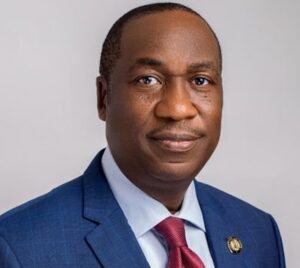Lagos hosts first VLR, as performance indicators call for critical actions to achieve SDGs 2030 targets
By Moses Adeniyi
The first Voluntary Local Review (VLR) on the Sustainable Development Goals (SDGs) in Nigeria has been carried out in Lagos, with a workshop organised by the State Government to assess the performance index of the targets towards actualising the 17 SDGs by 2030 in the State.
Stakeholders at the VLR workshop in Lagos gathered to analyse critical actions that actors must exert efforts on for intervention to localised actualisation of the SDGs in Lagos, weighing the progress push in the State towards the 17 goals.
According to a VLR report presented at the workshop, which optimised multi stage sampling technique with distribution of enumerators across 20 Local Government Areas (LGAs), and 37 Local Council Development Areas (LCDAs), with 21,000 samples drawn to make the survey representative of the Lagos demography, the State though doing fairly well comparatively to other sub nationals in the Country, must collaborate with other actors to facilitate efforts towards the 17 SDGs if it would achieve the targets set by the United Nations (UN) by 2030.
The report which analysed 91 indicators for SDGs in Lagos, found that in four of the 17 SDGs, Lagos was doing well, while actions were needed to boost progress to actualising the goals by 2030.
The report found that on SDG 1, zero – poverty, poverty level in Lagos has risen, as 10percent of the State’s population was living below the poverty line.
The COVID-19 pandemic, recent global shocks, and migration of unskilled workers into the State, were key among other factors found to have contributed to the problem.
Also, the report noted the State needed to address waste management as it was discovered it was far from the standard towards actualising the zero waste target.
On SDG 7, the report also noted that though the State is about 82 percent on access to clean energy, yet it was still below the 100percent UN target.
On SDG 3, the report established that the State on Healthcare was relatively close to the target, noting that should the State keep on the track, it would hit the target by 2030.
It noted recent records show drastic reduction in maternal and child mortality decreasing by about 20 percent.
The report, however, noted the State is at risk of skilled medical personnel loss due to increasing migration of health professionals, submitting that appropriate actions must be taken.
On Education, the report established the State was in line, but must muster actions to hit the target by 2030.
The report noted that on revenue generation the State must further muster actions to meet the target of 5percent of the GDP, up from the subsisting records of about 3 percent.
At the workshop stakeholders, including development partners, private sector leaders, agencies of government, civil society representatives, academia, non-governmental organisations, community of volunteers analysed the progress of the State in actualising the SDGs in 2030, agreeing that though the State has an advantage in comparative consideration with other subnationals in Nigeria, yet the there were much to do to further improve on progress.
At the Voluntary Local Review (VLR) validation workshop, Dr.OreOluwa Finnih, the Special Adviser to the Lagos State Governor, Mr. Babajide Sanwo-Olu on SDGs said it was “important to measure where we are, so that we know where we are going.”
According to her, the workshop marks a pivotal moment “in our collective journey toward achieving the Global Goals as well as co-creating an inclusive, just, and prosperous future for all residents of Lagos State.”
“The Voluntary Local Review as a sub-national endeavour has demonstrated local capacity and commitments of cities and regions to foster SDGs in rural communities. Thus, the state recognizes that the VLRs is not an end in itself but a process by which we assess our progress and shortcomings in implementing the SDGs through an inclusive process that involves all relevant actors,” she added.
She mentioned that the impact of the Voluntary Local Review Validation Programme is already being felt in cities and local governments around the world and has become a catalyst for change, inspiring innovative solutions and driving transformative action.
“While subnational reviews of 2030 Agenda have intrinsic value as part of the implementation process, they can also contribute to the national level Voluntary National Reviews (VNRs) and reinforce vertical coherence. It emphasizes the importance of embedding the process and its findings into existing implementation efforts and planning for effective follow-up,” she said.
She noted that since the adoption of the SDGs in 2015, Lagos has “ambitiously moved to pursue this transformative global agenda with every vigor it deserves.”
She added that the State has actively promoted localisation of the SDGs by being the first State in Nigeria to establish the Office of SDGs as a Cabinet Office and incorporating the framework into the State’s development plans.
“The establishment of civic engagement initiatives and platforms such as the Lagos State Volunteer Corp and the Lagos SDGs Youth Alliance has enabled citizens to become an active participant in governance.
“We have equally institutionalised SDGs in learning institutions and built cross-sectoral partnerships for all the Goals,” she added.
According to her, the validation exercise “will empower us with objective insights and constructive feedback which will enable us to fully understand our wins, close the gaps and provide potential opportunities to accelerate the attainment of these Goals.
“This remarkable initiative has empowered the state to lead the way in its drive towards achieving the global agenda. It has provided us with a platform to review our progress, share experiences, and learn from both the local communities and development partners,” she added.
She said further that “Significantly, this exercise will project how Lagos is addressing the three dimensions of sustainable development -economic, social and environmental in an integrated manner with examples of actions and policies aimed at unveiling interlinkages, enhancing synergies and avoiding trade-offs in the implementation of the SDGs.”
Acknowledging that more work remains to be done, she said pressing sustainability challenges from poverty, inequality, unemployment, environmental degradation and more, must still be overcome through concerted efforts.
“It is only through these collaborative efforts that we can surmount obstacles and unlock the full potential of Lagos as a Center of Excellence,” she said.
She mentioned that the outcomes of the workshop will strengthen the report to guide the path towards “the realization of the Lagos of our dream, without leaving anyone behind.”
Stakeholders at the event submitted that key plans were essential to accelerate actions to achieve localised SDGs targets in Lagos
Five key areas of concern demanding strategic actions include stimulation of economic growth and creation of jobs to eradicate poverty, significant improvement on living conditions across all dimensions in Lagos, enhancement of human capacity development, to achieve SDGs targets in the State.
The stakeholders noted demand executing same in sustainable manner – climate sensitive and inclusive.
They called for legislative backing for stakeholders to make input to localise stakeholders contributions.
Speaking, the Executive Chairman of the Onigbongbo LCDA, Oladotun Olakanle, said the State Government has embarked on projects which bear key relevance to the actualisation of the SDGs, mentioning the localisation of the implementation efforts have seen Local Government Areas have their residents benefiting from critical interventions, particularly in human capacity development.
“It’s been beneficial because the totality of their involvement has actually added value to the essence of local governments and the grassroots. My advice to all and sundry is for us to continue to tap and take advantage of every opportunity at our disposal,” he said.
He added that the VLR is “to give us data driven appraisal as to where we require more work,” he said, mentioning the lagging areas would be prioritised, as the government would strengthen partnership to address the lapses.
He said the VLR would give the State Government “as well as those of us at the local level, the opportunity to review the various data and statistics available, so that we can be able to project future development to impact our people generally.”
“If you decide to eradicate poverty, make life meaningful to the people, there is the need to constantly review what you are working on, so that you can always project for future advancement,” he said.
The Director of the Lagos State University Centre for the Actualization of the United Nations Sustainable Development Goals (LASU-SDG), Prof. Tayo Ajayi lauded the VLR initiative, stating academic institutions as critical stakeholders have major roles to play in achieving the 17 goals in all Countries of the World.
He mentioned the importance underscores why the Lagos State University has conceptualised a working contribution with the establishment of the SDGs club in the institution, a development, he said, has attracted the UN’s attention.




